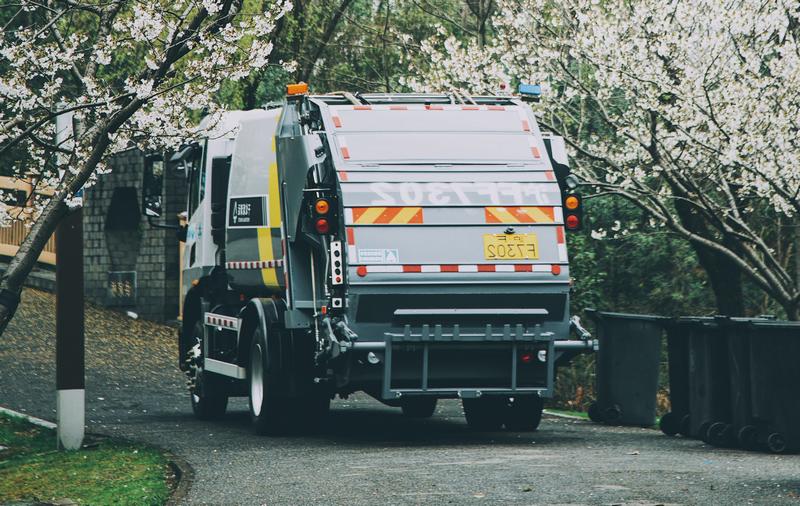Why Do Dogs Bark at Garbage Trucks? (+How to Stop!)
“Why do dogs bark at garbage trucks?” If this question keeps popping up in your mind, you’re in the right place. In this article, we’re going to tackle why your dog can’t seem to resist barking or even chasing after those noisy garbage trucks, and how to stop this behavior.
We’ll explain the possible reasons behind your dog’s fascination with these loud, large vehicles, and offer you effective solutions to keep them calm when a garbage truck comes around.
In case your dog’s scared of the garbage truck rather than excited, we’ll also address that issue and help you understand how to make trash pickup day less stressful for your furry friend. Keep reading below!
Dog Barking at Garbage Truck: How to Stop

To stop your dog from barking at the garbage truck, it’s crucial to understand why they’re barking and employ strategies like distraction, desensitization, or training commands like the “quiet” command.
- Understanding the Cause: Dogs bark at garbage trucks mainly due to their loud noises and large, intimidating size. They might perceive them as threats to their territory or get startled by the sudden loud noise. Understanding this helps you realize that your dog’s barking is a normal response to what they view as an intrusion.
- Distraction Techniques: Distract your dog when the garbage truck is about to arrive. This could be through a new toy, treat, or starting a play session. By shifting their focus from the garbage truck, they’ll likely forget about barking at it.
- Desensitization: Gradually expose your dog to the sound of garbage trucks. Start with low-volume recordings and reward your dog for staying calm. Over time, increase the volume to help your dog become accustomed to the noise.
- Teaching the “Quiet” Command: This command can be incredibly beneficial. Start by saying “quiet” when your dog is barking. Once they stop, even if just for a second, reward them with a treat or praise. Over time, your dog will associate the command with the reward and will learn to stop barking when they hear “quiet”.
These steps will get your dog to stop barking at the garbage truck, but it’s important to remember that the underlying behavioral issues (anxiety, territorial dominance, overexcitement, etc.) that were causing all of this to begin with will still be present. And until you address those, any positive changes you see are only going to be temporary.
“Well, how do I make these changes last then?”
By getting your dog to truly choose to follow your direction, that’s how. I tried many times to write out how you can do that before deciding it made more sense to just link you to the free video series that explains it better than I’d ever be able to.
The series is by a man named Dan who is one of the world’s leading dog obedience trainers. In it, he teaches you how to put an end to things like when your dog barks at the garbage truck and all other misbehavior using his fast and easy-to-follow methods.
In the first video, Dan will reveal to you why the two most common methods of dog training only doom you to failure. You can watch the video now by clicking here. Follow the proven system he’ll show you in his series and you’ll never have to spend another second worrying about your dog barking at the garbage truck ever again!
Why Do Dogs Bark at Garbage Trucks?

Dogs bark at garbage trucks due to their loud noise, large size, and the perceived intrusion into their territory. This response is rooted in their instinctual behaviors.
Noisy Disruption
Garbage trucks are well-known for their distinct and loud, rumbling noises. To us, it’s a sign that our waste is being collected, but to dogs, it can be an intimidating and unfamiliar sound. The loud mechanical sounds that these vehicles produce, coupled with the clattering of bins and trash, can easily trigger a fearful or anxious response in dogs. This reaction prompts them to bark as a way of expressing their discomfort and trying to alert their human family members to the presence of what they perceive as a potential threat.
Large, Imposing Presence
The size and the imposing presence of a garbage truck can be another reason why dogs bark at them. These vehicles are significantly larger than most other vehicles that pass by a dog’s home, and they tend to stop and linger, causing a noticeable disruption.
Dogs might perceive these large vehicles as a potential threat due to their sheer size and the vibrations they create when they’re nearby. This perceived threat can elicit a barking response as the dog attempts to ‘protect’ their territory from the ‘intruder’.
Perceived Territorial Intrusion
Dogs, by nature, are territorial animals. They identify specific spaces, like your house or yard, as their own and can become defensive when they believe their territory is being invaded. A garbage truck stopping by your house, the noise it makes, and the garbage collectors moving around your property could all be interpreted by your dog as an intrusion into their territory. This causes them to bark in an attempt to ward off these ‘intruders’ and assert their dominance over their space.
Break in Routine
Lastly, garbage trucks usually break the routine of a quiet street. They often come at early hours, creating a sudden and unexpected change in the environment. This change can startle dogs or make them uneasy, leading them to bark. Dogs, like many animals, are creatures of habit and tend to be uncomfortable with unexpected disruptions to their routine, leading to vocal expressions of their unease.
In conclusion, dogs bark at garbage trucks primarily due to their instinctual responses to noise, size, perceived intrusion, and unexpected changes in routine. Understanding these triggers can help you manage and treat your dog’s behavior more effectively. We explained the steps to do that in the first section.
It’s important to start working with your dog right away because a failure to do so will just mean that their problem will get even worse. You’ll find your dog barking at people walking past, barking at people on bikes, or barking at people jogging by. It may even escalate into dominance and aggression towards other dogs or growling at you for no reason.
Why Do Dogs Chase Garbage Trucks?
Dogs chase garbage trucks due to their instinctual prey drive, territorial behavior, and response to loud noises and large moving objects. Understanding these behaviors can help manage and train your dog better.
Prey Drive
The instinctual prey drive is a likely reason behind your dog’s propensity to chase garbage trucks. The concept of prey drive involves behaviors related to chasing and capturing prey, traits inherited from their wild ancestors.
While your domestic dog doesn’t need to hunt for survival, this ingrained behavior can manifest in other ways, such as chasing fast-moving objects like cars, cyclists, and, of course, garbage trucks. The trucks’ size and speed can trigger your dog’s innate urge to chase, a leftover instinct from their predatory ancestors.
Response to Loud Noises and Large Objects
Garbage trucks are large, imposing, and noisy, which can be very exciting or frightening for a dog. Their attention might be captured by the loud noise the truck makes, and they might feel challenged or threatened by its large size and rapid movement.
The truck’s noise and size, coupled with its moving parts, might be too enticing for your dog to resist. This could explain why your dog might chase after a garbage truck, even though they generally don’t show such behavior with other vehicles or objects.
Protecting Their Territory
Another reason why dogs chase garbage trucks is due to their territorial instincts. Dogs are naturally protective of their space, and when they see a large, noisy vehicle like a garbage truck approach their home, they might interpret it as an intruder. The act of chasing the truck could be your dog’s attempt to protect their territory and drive away what they perceive to be a threat.
Energy Release
Finally, if your dog is a high-energy breed or isn’t getting enough exercise, they may chase garbage trucks as a way of releasing pent-up energy. Regularly chasing moving objects can become a form of self-entertainment and a method for dogs to keep themselves mentally and physically stimulated.
In conclusion, dogs chase garbage trucks due to a mixture of instinctual drives, territorial behaviors, responses to loud noises, and a need to release excess energy. Addressing these aspects can help manage your dog’s urge to chase these vehicles, ensuring their safety and well-being. Learn how to do these things in the first section of this article.
Dog Scared of Garbage Truck: How to Desensitize
To desensitize a dog scared of garbage trucks, gradual exposure combined with positive reinforcement is the key. Start with low-stress scenarios and slowly increase the intensity as your dog becomes more comfortable.
- Understand the Fear: Dogs can get scared of garbage trucks due to several reasons like the loud noise they make, their large size, and the significant vibrations they cause. This can be overwhelmingly intimidating for a dog, especially if they are particularly sensitive to loud sounds, sudden movements, or if they are naturally timid by nature. Identifying and understanding the root cause of your dog’s fear is the first, fundamental step towards addressing and overcoming it. Patience and keen observation skills are crucial during this initial phase.
- Gradual Exposure: Begin the process of desensitizing your dog to garbage trucks by gradually exposing them to the sights and sounds of these vehicles in a controlled environment. This could be done by initially playing recorded sounds of a garbage truck at a low volume, allowing your dog to get used to the noise in a stress-free setting. Gradually increase the volume over a period of days or weeks as your dog becomes more accustomed to the sound. During this period, observe your dog closely to gauge their comfort levels and adjust the volume accordingly.
- Positive Reinforcement: During these gradual exposure sessions, it is crucial to reward your dog for maintaining calm and composed behavior. You can do this by giving them their favorite treat, showering them with praise, or providing a favorite toy each time they exhibit a non-fearful response to the sound of the garbage truck. This positive reinforcement helps associate the formerly scary garbage truck presence with a positive, rewarding experience, thus helping to reduce their fear and anxiety over time.
- Real-Life Exposure: Once your dog appears to be comfortable with the recorded sounds of a garbage truck, you can then attempt to expose them to real-life situations. This could be done by intentionally scheduling their walks during the times when the garbage truck usually makes its rounds in your neighborhood. Make sure to maintain a safe distance initially, gradually decreasing this distance as your dog’s comfort levels increase. Keep the environment controlled as much as possible to prevent any negative experiences during these critical stages of desensitization.
- Persistent Practice: Consistency is of the utmost importance in this process. Continue with these desensitization and positive reinforcement training sessions on a regular basis. It’s essential to remain patient, as progress may be slow and sometimes even non-linear. With persistent practice, however, your dog should gradually overcome their fear of garbage trucks, paving the way for more peaceful walks and a happier dog overall.
In conclusion, by understanding your dog’s fear, gradually exposing them to the sound of garbage trucks, rewarding calm behavior, and maintaining a regular training schedule, you can effectively desensitize your dog to their fear of garbage trucks. Learn how to help them through this process in the first section of this article.
I’m sure you’re ready for your dog to stay quiet when the trash truck comes, so I’ll let you get started on things now. Best of luck with all of this, and thank you for reading our article “Why Do Dogs Bark at Garbage Trucks? (+How to Stop!)”





